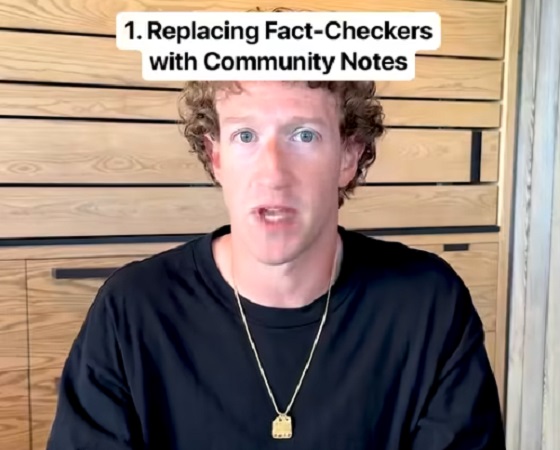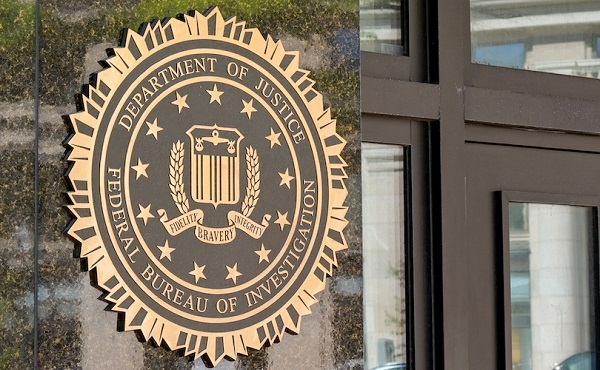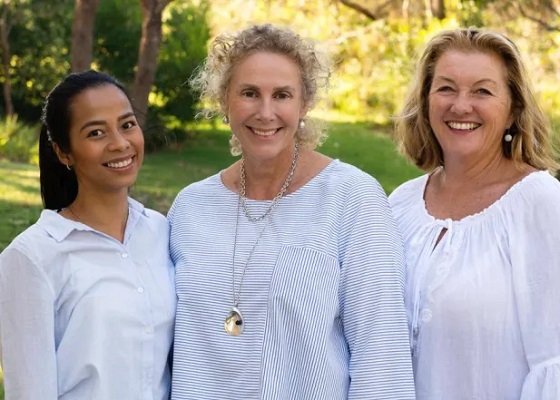Censorship Industrial Complex
AboutFacebook: Zuckerberg zaps fact checkers in favour free speech

It is time to focus on reducing mistakes, simplifying our systems and getting back to our roots about giving people a voice.
Mark Zuckerberg surprised the planet today with the release of a 5 minute video detailing a 5 point plan to pave the way for more free expression on Facebook.
Zuckerberg says his goal has always been to “give people a voice”, but governments and legacy media have been pushing Facebook towards censorship. Now Facebook is going to concentrate on censoring illegal issues, and back off on punishing speech.
The five part plan includes:
- Getting rid of fact checkers in favour of ‘X’ style “Community Notes”
- Simplifying content policies to get rid of restrictions around topics like immigration and gender.
- Focus filters on tackling illegal and ‘high severity violations’ instead of low severity violations.
- Bringing back ‘Civic Content’, so more ‘political’ content will be seen.
- Facebook will move Content Moderation Teams from California to Texas to help erase the ‘bias of our teams’ and work with Donald Trump’s government to help promote free speech around the world.
From Mark Zuckerberg Facebook
It’s time to get back to our roots around free expression. We’re replacing fact checkers with Community Notes, simplifying our policies and focusing on reducing mistakes. Looking forward to this next chapter.
Zuckerberg’s full comments:
Hey, everyone. I want to talk about something important today because it’s time to get back to our roots around free expression on Facebook and Instagram. I started building social media to give people a voice. I gave a speech at Georgetown five years ago about the importance of protecting free expression, and I still believe this today. But a lot has happened over the last several years. There’s been widespread debate about potential harms from online content.
Governments and legacy media have pushed to censor more and more. A lot of this is clearly political, but there’s also a lot of legitimately bad stuff out there. Drugs, terrorism, Child exploitation. These are things that we take very seriously, and I want to make sure that we handle responsibly. So we built a lot of complex systems to moderate content.
But the problem with complex systems is they make mistakes. Even if they accidentally censor just 1% of posts. That’s millions of people. And we’ve reached a point where it’s just too many mistakes and too much censorship. The recent elections also feel like a cultural tipping point towards once again prioritizing speech. So we’re gonna get back to our roots and focus on reducing mistakes, simplifying our policies, and restoring free expression on our platforms. More specifically, here’s what we’re going to do.
First, we’re going to get rid of fact checkers and replace them with community notes similar to acts starting in the US. After Trump first got elected in 2016, the legacy media wrote nonstop about how misinformation was a threat to democracy. We tried in good faith to address those concerns without becoming the arbiters of truth. But the fact checkers have just been too politically biased and have destroyed more trust than they’ve created, especially in the US. So over the next couple of months, we’re going to phase in a more comprehensive community note system.
Second, we’re going to simplify our content policies and get rid of a bunch of restrictions on topics like immigration and gender that are just out of touch with mainstream discourse. What started as a movement to be more inclusive has increasingly been used to shut down opinions and shut out people with different ideas. And it’s gone too far. So I want to make sure that people can share their beliefs and experiences on our platforms.
Third, we’re changing how we enforce our policies to reduce the mistakes that account for the vast majority of censorship on our platforms. We used to have filters that scanned for any policy violation. Now we’re going to focus those filters on tackling illegal and high severity violations and for lower severity violations. We’re going to rely on someone reporting an issue before we take action. The problem is that the filters make mistakes and they take down a lot of content that they shouldn’t. So by dialing them back, we’re going to dramatically reduce the amount of censorship on our platforms. We’re also going to tune our content filters to require much higher confidence before taking down content. The reality is that this is a tradeoff. It means we’re going to catch less bad stuff, but we’ll also reduce the number of innocent people’s posts and accounts that we accidentally take down.
Fourth, we’re bringing back civic content. For a while, the community asks to see less politics because there’s making people stressed. So we stopped recommending these posts. But it feels like we’re in a new era now and we’re starting to get feedback that people want to see this content again. So we’re going to start phasing this back into Facebook, Instagram and threads while working to keep the communities friendly and positive.
Fifth, we’re going to move our trust and safety and content moderation teams out of California, and our US based content review is going to be based in Texas. As we work to promote free expression, I think that will help us build trust to do this work in places where there is less concern about the bias of our teams. Finally, we’re going to work with President Trump to push back on governments around the world. They’re going after American companies and pushing to censor more.
The U.S. has the strongest constitutional protections for free expression in the world. Europe has an ever increasing number of laws institutionalizing censorship and making it difficult to build anything innovative there. Latin American countries have secret courts that can order companies to quietly take things down. China has censor apps from even working in the country.
The only way that we can push back on this global trend is with the support of the US government. And that’s why it’s been so difficult over the past four years when even the US government has pushed for censorship by going after US and other American companies. It has emboldened other governments to go even further. But now we have the opportunity to restore free expression and I am excited to take it. It’ll take time to get this right. And these are complex systems. They’re never going to be perfect. There’s also a lot of illegal stuff that we still need to work very hard to remove.
But the bottom line is that after. For years of having our content moderation work focused primarily on removing content. It is time to focus on reducing mistakes, simplifying our systems and getting back to our roots about giving people a voice. I’m looking forward to this next chapter. Stay good out there. And more to come soon
Censorship Industrial Complex
FBI urged to release withheld records on Hunter Biden laptop, other ‘Twitter Files’

From LifeSiteNews
By Dan Frieth
Judicial Watch initiated the lawsuit in April 2023, targeting the DOJ, the Department of Homeland Security, and the Office of the Director of National Intelligence
A hearing took place Wednesday, before U.S. District Judge Sparkle L. Sooknanan, in a Freedom of Information Act (FOIA) lawsuit brought by Judicial Watch against the Department of Justice (DOJ).
The case seeks records related to the “Twitter Files,” particularly those involving Hunter Biden’s laptop and allegations of censorship.
The only matter still pending is the FBI’s withholding of records detailing two meetings between agency officials and Twitter representatives from the Biden administration.
Judicial Watch initiated the lawsuit in April 2023, targeting the DOJ, the Department of Homeland Security, and the Office of the Director of National Intelligence.
The legal action followed the FBI’s failure to respond to a December 2022 FOIA request for communications between FBI personnel and key Twitter figures, including Yoel Roth, Vijaya Gadde, and Jim Baker, from June 2020 to December 2022.
These individuals were involved in discussions about suppressing the New York Post’s Hunter Biden laptop story, as disclosed in journalist Matt Taibbi’s December 2022 “Twitter Files.”
Tom Fitton, president of Judicial Watch, expressed strong disappointment: “It is frustrating beyond belief for Judicial Watch to have to go to federal court for basic information on Biden’s abuse of the FBI, using Twitter to censor and monitor Americans.”
Through a mix of FOIA requests and legal action, Judicial Watch continues to document extensive censorship efforts that affected tens of millions of Americans.
In November 2024, it obtained DHS records showing a widespread campaign, by both government and private groups, to police and suppress social media posts concerning election fraud in 2020.
Additional records from June 2024, released through Judicial Watch litigation, revealed that just before and after the 2020 election, state officials flagged alleged misinformation and sent it to entities like the Center for Internet Security, CISA, and the Election Integrity Partnership (EIP), a DHS-backed nonprofit known for targeting online election discourse.
In December 2023, DHS documents exposed coordination between CISA and the EIP to conduct “real-time narrative tracking” on major social media platforms in the run-up to the 2020 vote.
Similar records surfaced in November 2023, showing EIP’s influence over platforms such as Google, Twitter, Facebook, TikTok, Pinterest, and Reddit to suppress “disinformation.”
Reprinted with permission from Reclaim The Net.
Censorship Industrial Complex
Jordan Peterson reveals DEI ‘expert’ serving as his ‘re-education coach’ for opposing LGBT agenda

From LifeSiteNews
The Ontario College of Psychologists has selected Jordan Peterson’s “re-education coach” for having publicly opposed the LGBT agenda.
In a June 16 op-ed published by the National Post, Canadian psychologist Dr. Jordan Peterson revealed that U.K. citizen Harry Cayton will guide him through the mandatory training.
“In the last week … the College has re-established contact, after months of unnecessary delay, which occurred in violation of their own order and guidelines. They have made me an entirely new offer, all the while insisting that this was their intent all along, which it most clearly was not,” Peterson said.
“All they really want, it turns out, is one two-hour session, which will not involve any ‘social media’ training,” he further explained. “This will be conducted by a man — one Harry Cayton — a citizen of the U.K., who is neither social media expert, according to the College and is definitely not a psychologist.”
Harry Cayton, a supposed expert on “professional regulation and governance,” is known professionally for promoting Diversity, Equity, and Inclusion (DEI) initiatives.
In 2021, he was appointed to conduct an independent review of the British Columbia Law Society’s governance structure, specifically examining how it supports DEI goals.
Additionally, in 2022, while appearing on Ascend Radio’s podcast, Cayton argued there should be more DEI regulations in professional associations.
Peterson has promised to make the details of his “re-education” public, questioning why the College wishes to hide what Cayton plans to discuss with him.
“If I am the intransigent fool, and he is the wizard to set things right, why not bless everyone interested with his wisdom, and allow them to participate in the restructuring of my psyche and eventual enlightening? Why the concern with confidentiality?” he asked.
Peterson also explained that he will publicize the training “so that people who are interested can decide for themselves what is going on.”
In January 2024, Peterson lost his appeal of the board’s decision to compel him to undergo mandatory re-education, meaning that he must attend the training or risk losing his license to practice psychology in Ontario.
Peterson also revealed that his “legal options have” now “been exhausted” after Ontario’s highest court rejected his appeal of the College’s 2022 ruling that his public political statements ran afoul of the administrative board’s rules and that he must therefore submit to, and personally pay for, a “coaching program” on professionalism.
Peterson is a widely-known critic of Canada’s increasingly totalitarian government. He has also spoken frequently on the need for young men to accept and take on personal responsibility. While he has seemingly inspired others to explore Christianity, he has not yet espoused a personal belief in any religion, though he affirmed his wife Tammy in her decision to convert to Catholicism in 2024.
-

 Bruce Dowbiggin16 hours ago
Bruce Dowbiggin16 hours agoWhat Connor Should Say To Oilers: It’s Not You. It’s Me.
-

 Business17 hours ago
Business17 hours agoFederal fiscal anchor gives appearance of prudence, fails to back it up
-

 Business15 hours ago
Business15 hours agoThe Passage of Bill C-5 Leaves the Conventional Energy Sector With as Many Questions as Answers
-

 Alberta13 hours ago
Alberta13 hours agoAlberta poll shows strong resistance to pornographic material in school libraries
-

 Business11 hours ago
Business11 hours agoCanada should already be an economic superpower. Why is Canada not doing better?
-

 Crime12 hours ago
Crime12 hours agoFlorida rescues 60 missing kids in nation’s largest-ever operation
-

 Banks14 hours ago
Banks14 hours agoScrapping net-zero commitments step in right direction for Canadian Pension Plan
-

 Business2 days ago
Business2 days agoBehind the latest CPI Numbers: Inflation Slows, But Living Costs Don’t



